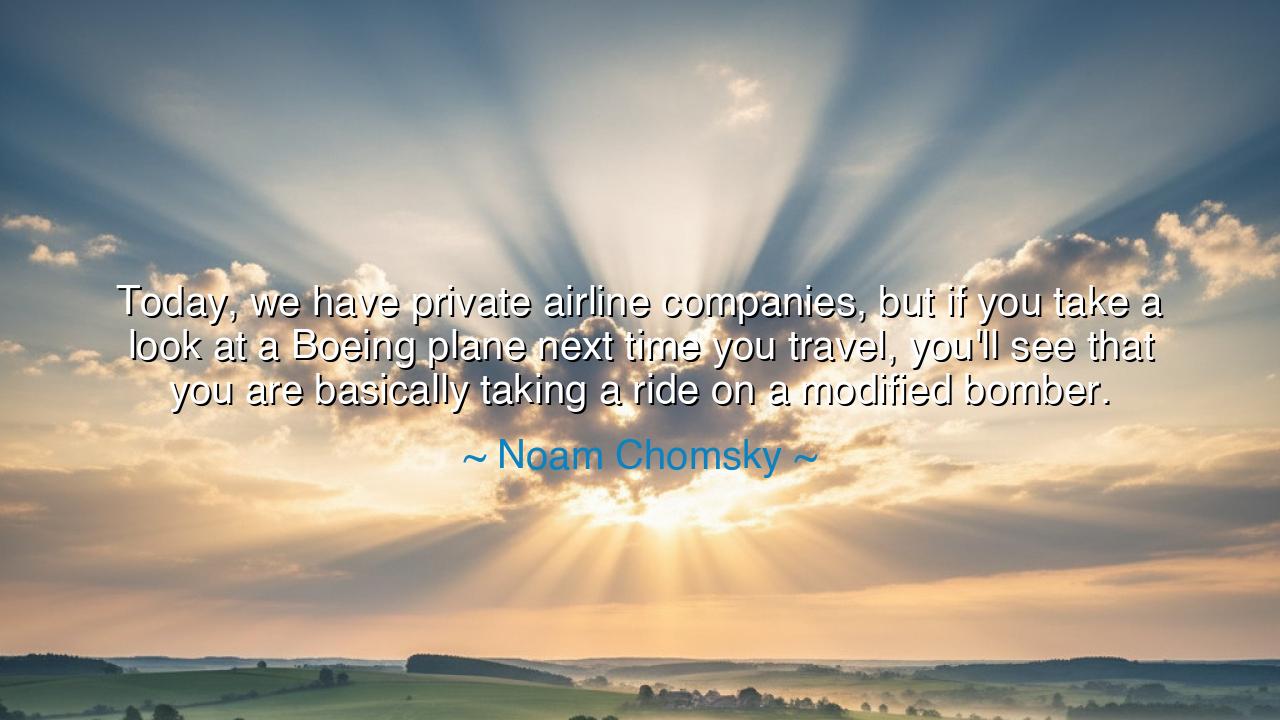
Today, we have private airline companies, but if you take a look
Today, we have private airline companies, but if you take a look at a Boeing plane next time you travel, you'll see that you are basically taking a ride on a modified bomber.






Hear, O seeker of truth, the words of Noam Chomsky, a voice that pierces through the illusions of power: “Today, we have private airline companies, but if you take a look at a Boeing plane next time you travel, you’ll see that you are basically taking a ride on a modified bomber.” This saying does not merely speak of metal and engines, but of the hidden roots of our age. It reveals that what seems to be peaceful, civilian, and ordinary is often born from the fire of war. The gentle wings that carry us through the skies are the descendants of wings built for destruction.
Chomsky, in his wisdom, unmasks the intertwining of war and commerce, of violence and progress. For the sleek aircraft that carries the traveler across continents is not an innocent invention. It is a re-forged weapon, a child of the bomber, reshaped for the market. Thus, he shows us that the world we inhabit is layered with histories of conflict, that our comforts are often laid upon foundations of violence. To ride a plane is to ride upon the shoulders of history, to unknowingly sit within the husk of warfare transformed.
Consider the story of the Second World War, when the skies thundered with bombers raining fire upon cities. Factories that once forged tools of peace were conscripted into the service of destruction, and engineers who dreamed of exploration turned their minds to the machinery of death. When the war ended, these same minds, these same factories, were turned once more to civilian use. The bombers were reshaped into airliners, their destructive power softened into engines of transport. Thus, the birth of the modern airline industry is written in the ink of both tragedy and triumph.
Yet this is no condemnation of progress, but a reminder. For Chomsky’s words cry out: do not be deceived by appearances. What appears peaceful may be born of war, and what is celebrated as innovation may have emerged from necessity’s darker face. This is the paradox of human history: that from the furnaces of conflict arise the tools of peace, and from instruments of death are born the means of life. The great highways, the vast internet, the medicine of trauma—all were sharpened in the crucible of war before they were softened for humanity’s healing.
We see also in this quote the eternal tension of human nature: our genius is double-edged. The mind that builds a bomber can also build a lifeline; the spirit that destroys can also preserve. This duality calls upon us to be vigilant, to ensure that the tools we inherit are turned toward life and not back toward destruction. Chomsky’s lesson is thus one of awareness: that we must not walk blindly in the world, for even the most ordinary things may carry shadows from the past.
The ancients would have seen this truth as the law of transformation. Just as the sword of the warrior can be melted down into the plowshare of the farmer, so can the bomber become the airplane of the traveler. But the choice lies always with humankind: shall we shape our knowledge into weapons, or into bridges? Shall we build for war, or for peace? Chomsky’s words remind us that we live amidst these choices, and that we are responsible for how the legacy of violence is transmuted into the fabric of our lives.
What lesson, then, shall the listener draw? It is this: look deeper into the things you trust and use. Question their origins, understand their histories, and carry that awareness with humility. Do not be content with the glitter of the surface—see also the shadows beneath. In doing so, you will walk not as one who is blind, but as one awakened to the true nature of the world.
In practice: when you travel upon a plane, when you use the tools of science, when you live within the structures of society—ask yourself what histories lie within them. Reflect upon the duality of human invention, and choose always to direct your own creations toward life, not destruction. For though we ride on wings born of bombers, we are not condemned to repeat the errors of the past. The power is in our hands to turn the legacies of war into instruments of peace, and to ensure that the skies thunder not with bombs, but with the quiet song of journeys shared among peoples.






AAdministratorAdministrator
Welcome, honored guests. Please leave a comment, we will respond soon